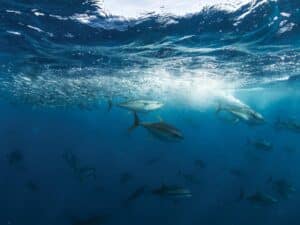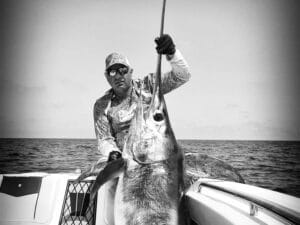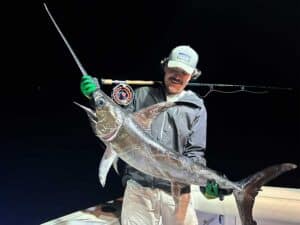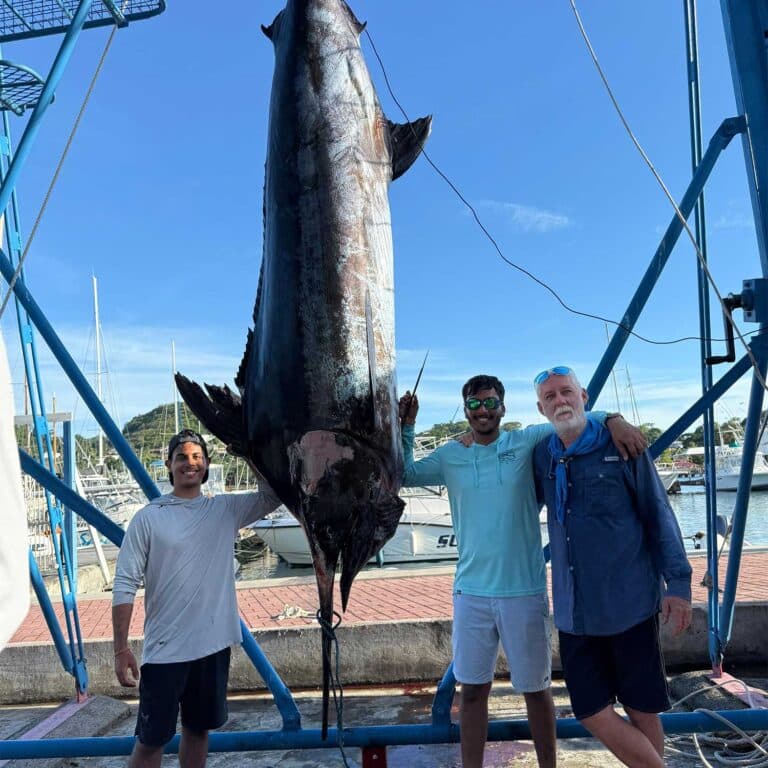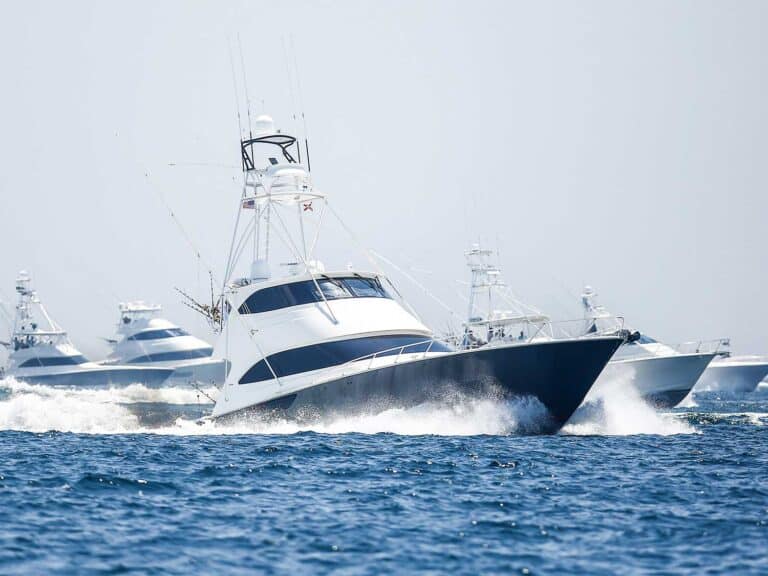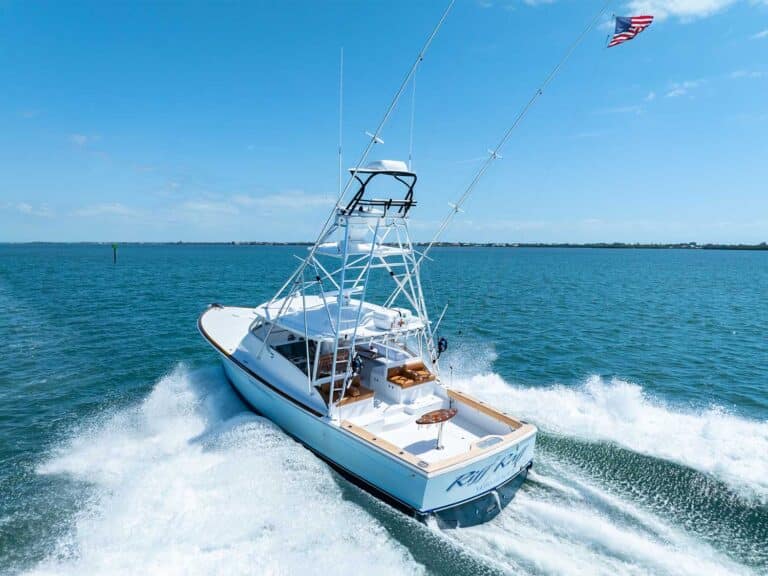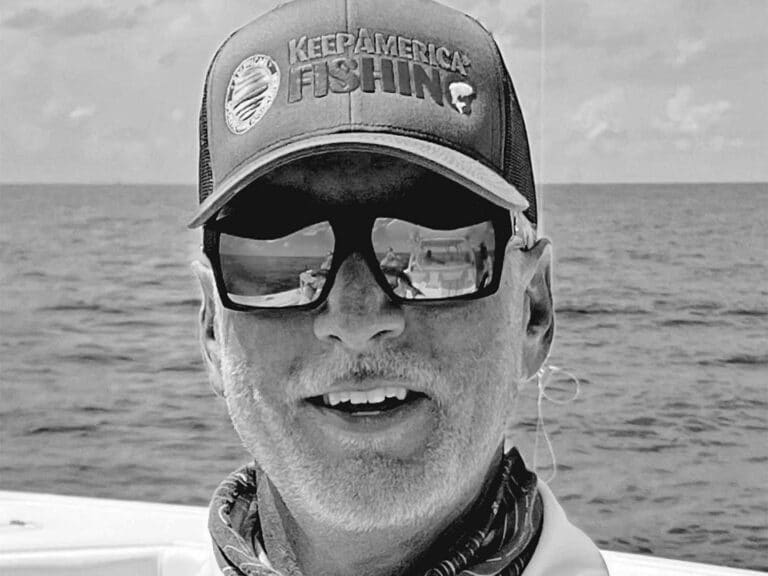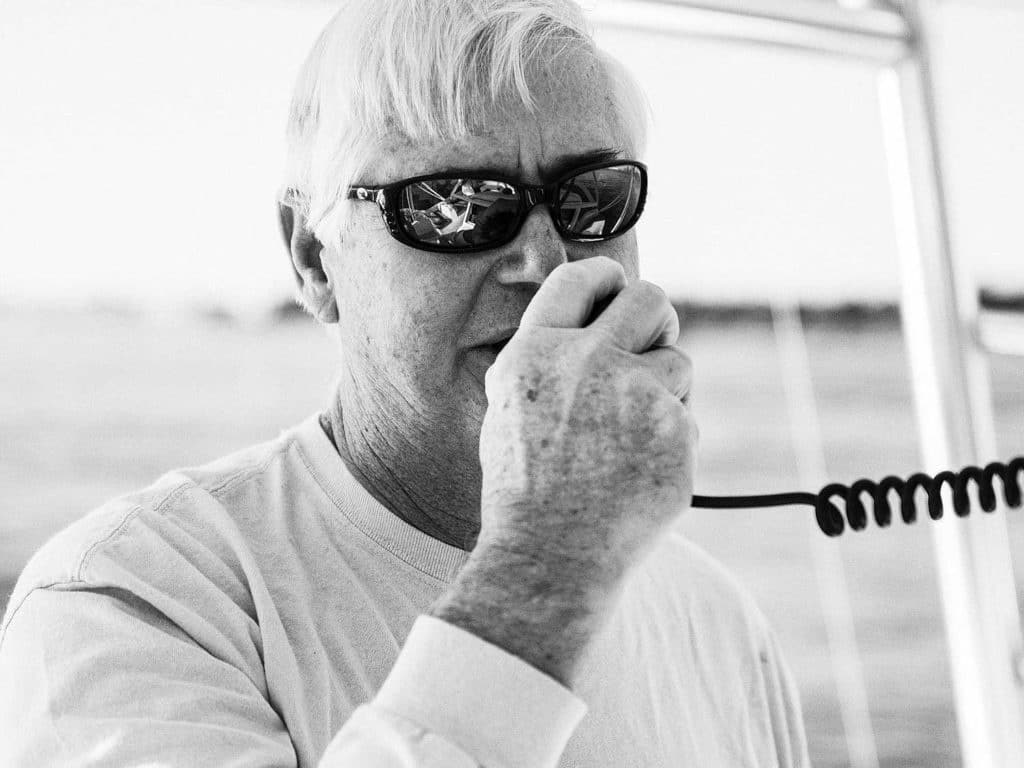
Peter “Doc” Watson’s dreams of owning a sport-fishing boat began when he was just 7 years old, standing with his father atop the windswept dunes of Fort Macon, overlooking Beaufort Inlet at the eastern tip of Atlantic Beach, North Carolina. The allure of the sea, the style of the boats, and a rich and storied fishery that lay just over the horizon sparked a fire that still burns brightly within him more than 50 years later.
With a passion for fishing as well as his family, Watson began frequently offshore fishing in 1989 in a gasoline-powered 27-foot Phoenix, his first “big boat.” Just two years later, Watson purchased a 1971 36-foot Hatteras Convertible named Corral. With his wife, Anita—who enjoys cooking for her family and friends on the dock—and family on board for many trips, Watson eventually found himself seeking an even larger boat. This jump would propel him into the custom-boat arena, building a 54-foot Gary Davis aptly named Anita Jean, which was commissioned in fall 1993 and launched in June 1996.
Owning a much larger sportboat allowed the Watson family to fish internationally, including jaunts from their North Carolina home port east to the island of Bermuda and south to Isla Mujeres, Mexico. In addition to the travel, Watson was also now fishing in many popular tournaments along the East Coast, as well as the Bermuda Triple Crown. Now, with grown children—Raleigh, Corinne and Spencer—Watson had the urge to build a boat with more capabilities; a larger galley for Anita was also on the wish list for a new boat.
Watson’s oldest son, Raleigh, attended high school with the now very accomplished North Carolina boatbuilder Tim Winters. Watson enjoys working with younger, up-and-coming builders, so in 2010, he began building the latest iteration of Anita Jean, a 64-foot Winter, which was completed in 2013.
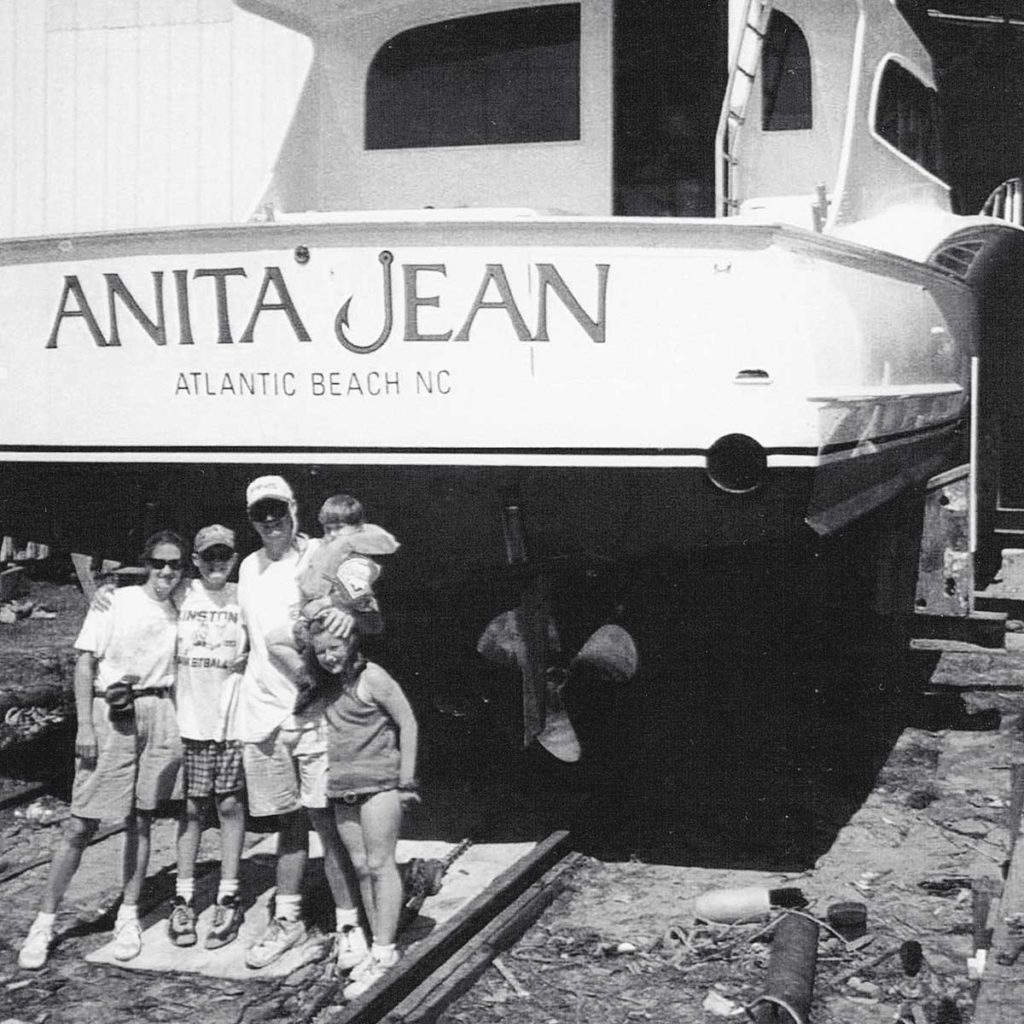
Although Winters is already known for having curvy boats, Watson wanted to make her an especially unique custom design, which was the start of an enjoyable collaboration between an experienced owner/operator and a talented custom builder. Winters increased the crown of the deck and the belly on the transom, adding curves upon curves to create a true showpiece that would stand out, even among the custom North Carolina fleet. While the exterior styling continued, Anita assisted with the galley design, which increased in footprint to the style usually found on much larger vessels. They also focused on other details, such as maximizing fuel capacity, an abundance of rod storage, and many other aspects of the interior.
During the Big Rock that year, Watson’s father caught his first marlin at nearly 70 years old, and Watson caught his first blue as well.
Where the Marlin Bug Began
In 1993, when Watson was running the older 36-foot Hatteras, he decided to fish North Carolina’s Big Rock Blue Marlin Tournament, despite having never caught a marlin. Corral was docked in the same marina as Darrell Morgan’s Sea Merchant; Morgan also ran the marina. When it came to marlin fishing back then, as with many other North Carolinians, Morgan’s preferred spread consisted of six blue-and-white Ilanders with ballyhoo. Watson decided to take his mentor’s advice and utilized the same technique. During the Big Rock that year, Watson’s father caught his first marlin at nearly 70 years old, and Watson caught his first blue as well. A year later, Watson told his friend Jimmy Hayes that the experience would cost him millions of dollars because it ignited his marlin-fishing bug, and the Gary Davis-built Anita Jean began construction.
The Doctor is In
So why is an owner/operator so unique in this situation? The answer lies in Watson’s passion for his career choice, which was made long before college. His father was a small-town family physician, back in the days when primary-care doctors performed everything from routine to emergency care, surgery and even home visits. Inspired by his father’s passion for medicine and helping others in need, Watson knew very early that he wanted to continue the tradition, with a twist.
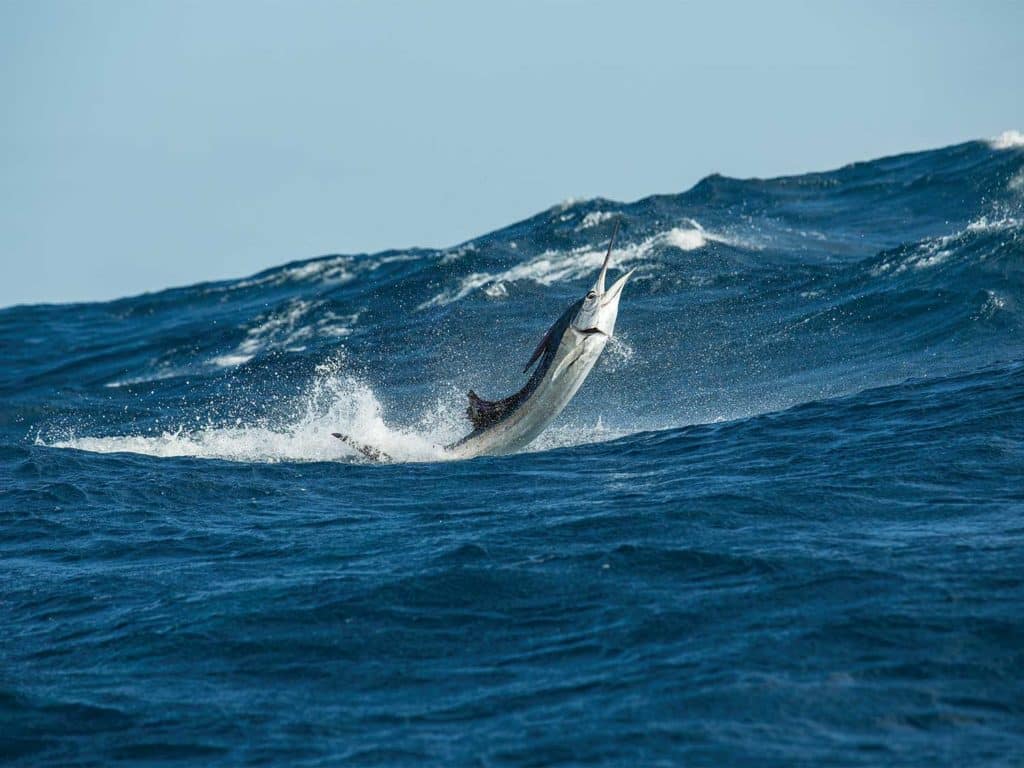
Watson experienced a lot of cancer in his family, and with various residency rotations in oncology, he took that as a sign to focus his career in that specialty. In 1988, several years after graduating from medical school, he found himself in Kinston, North Carolina, and since he wanted to live on the coast, he thought his stay there would be brief. But after a few years, the practice had grown and he was now a member of a growing multispecialty group, offering primary-care, gastrointestinal and cardiology services. In 2000, Watson began performing clinical trials in the small eastern North Carolina town, bringing additional services and technology to patients in an area that was very much underserved in those days. One of his good friends, Duke University surgeon Billy Peete, once wrote of Watson: “He’s like Albert Schweitzer—it’s easy to do a lot of good where there’s a big need,” and there was definitely a big need. Today, Watson remains a well-respected oncologist in Kinston, where he is well-known for his treatment and research work. More importantly though, he’s thought of as family to his patients who trust him implicitly in dealing with the unimaginable disease of cancer, which is the second leading cause of death in the US.
There have also been times where Doc Watson’s expertise has been requested on the water. Some scenarios have had better outcomes than others. His good friend Mike Tolston remembers one time while fishing off Isla Mujeres, a local mate on another boat had a hook stuck in his forearm. The boats met offshore, and they brought the unfortunate fisherman aboard Anita Jean. The mate was terrified of needles, so he looked away while Tolston held his arm and Watson injected lidocaine. As luck would have it, the hook simply fell out of the mate’s arm without Watson having to do anything. Tolston laughs while telling the story, saying: “I just chuckled and bit my lip. The mate had no idea because his eyes were closed, and he thought Doc had performed a miracle.” For the remainder of their time in Mexico, fresh ballyhoo appeared behind Anita Jean early each morning, and the local mate and his buddies were always there if Watson needed anything.
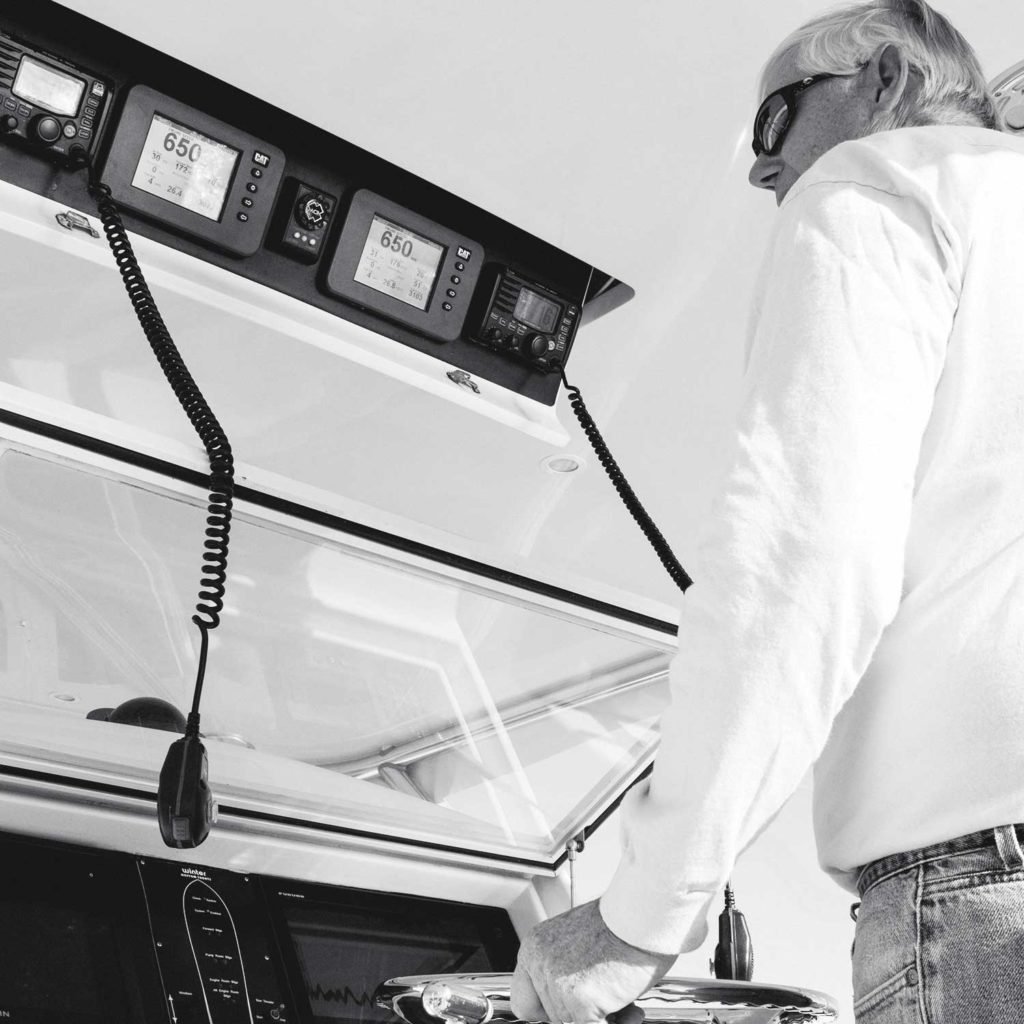
As with fishing, sometimes it can be better to be lucky than good.
A Romance for the Ocean
A lesson Watson’s father instilled in him was that every day is a unique experience on the ocean; you never know what could happen or what you could catch. It is always a complete getaway—an escape, even for just a few hours—from life on land. Fishing is also one of the few things you can enjoy at any age, whether you’re 7 or 87. And even if you don’t catch anything, the camaraderie of being around family and friends is just as sweet. Watson also reminded me of something Anita says often, “Dinner and a flag is a great day.” She’s right.
“He gave my siblings and me those core disciplines such as the value of hard work, and that you need to earn everything you have, which he displayed every day as we were growing up.”
I spoke extensively with Watson’s oldest son, Raleigh, who has the same passion for fishing as his father. “I couldn’t have asked for a better father,” he says. “He gave my siblings and me those core disciplines such as the value of hard work, and that you need to earn everything you have, which he displayed every day as we were growing up, and continues today.” And while hard work is important, as Raleigh can attest, Watson is happiest with his family. “Dad takes pride in being a good doctor more than a good fisherman,” he says.
That passion for medicine sometimes drives Watson to push himself to the limit physically as well. On one trip, Raleigh says that his father saw patients in the hospital and its associated clinic from 4 a.m. until noon, then drove an hour and a half for a flight out of Raleigh-Durham airport to Palm Beach, Florida, and another drive up to Stuart, where the boat was loaded for a trip to the Bahamas. Eventually they left the dock at midnight. Watson ran the boat for several hours and then had a three-hour catnap before bringing Anita Jean into Nassau the following day, a run of about 230 miles.
Tournament Tales
Watson and the Anita Jean team had just finished fishing the 2001 Big Rock with his usual crew, who taught Anita how to tie knots and rig ballyhoo. Next up: the Hatteras Marlin Club Blue Marlin Release Tournament. This would be the first time Watson had fished with only his wife and kids as his tournament crew: Anita; Raleigh, then 16; his sister, Corinne, 13; and Spencer, 7. Early in the day, they hooked a big dolphin, and it was a cluster of crossed lines and commotion in the cockpit as they boated the gaffer. Soon after, Anita looked ahead on a weed line and saw a billfish free-jumping, so Watson steered in that direction, where they hooked the blue marlin a few minutes later. After the release, they turned back toward the weed line and hooked a second blue, releasing that one as well. That was enough to put them in first place after Day One. On Day Two, they hooked and released a larger blue right off the bat but didn’t see another fish the rest of the day, yet it was enough to win the tournament. The following year they returned to Hatteras, where they finished in second place on time, once again fishing with only the family as the crewmembers on the boat.
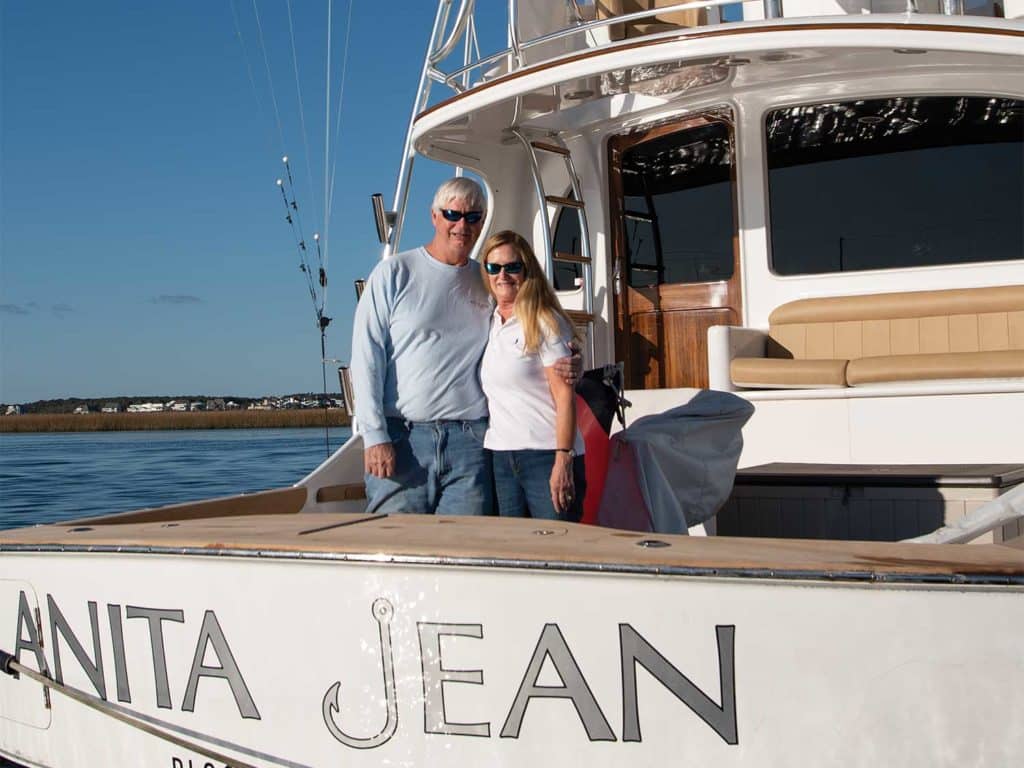
The 64-foot Winter is a much larger vessel and makes the crossing to Bermuda much easier than on the Gary Davis-built boat. Watson says Bermuda is his favorite location because you’re looking for big fish. “We almost won the Triple Crown the second or third year we fished there,” he says. “We were in the third leg and way behind, and started with a zero on Day One. We moved to the east on the second day and ended up going 3-for-4 on blue marlin, which was a great improvement and really helped move us up in the standings. We were just 558 points out of first place. The last day, we released a blue right away but lost two more during the day, and we missed first place by only 58 points. Not bad for not having any professional crew aboard though.”
And as any tournament fisherman will tell you, sometimes it’s those unique situations that really make you smile. During the Ducks Unlimited Band the Billfish tournament in Morehead City one year, Watson’s youngest son, Spencer, caught a small dolphin that weighed maybe 5 pounds. “I wanted to release it, but it was Spencer’s fish, so we kept it,” he says. “He also wanted us to weigh it, but that meant we would have to run over to the waterfront, so I said no. As luck would have it, we were tied for first place, so if we had weighed in anything at all, we would have won the tournament.”
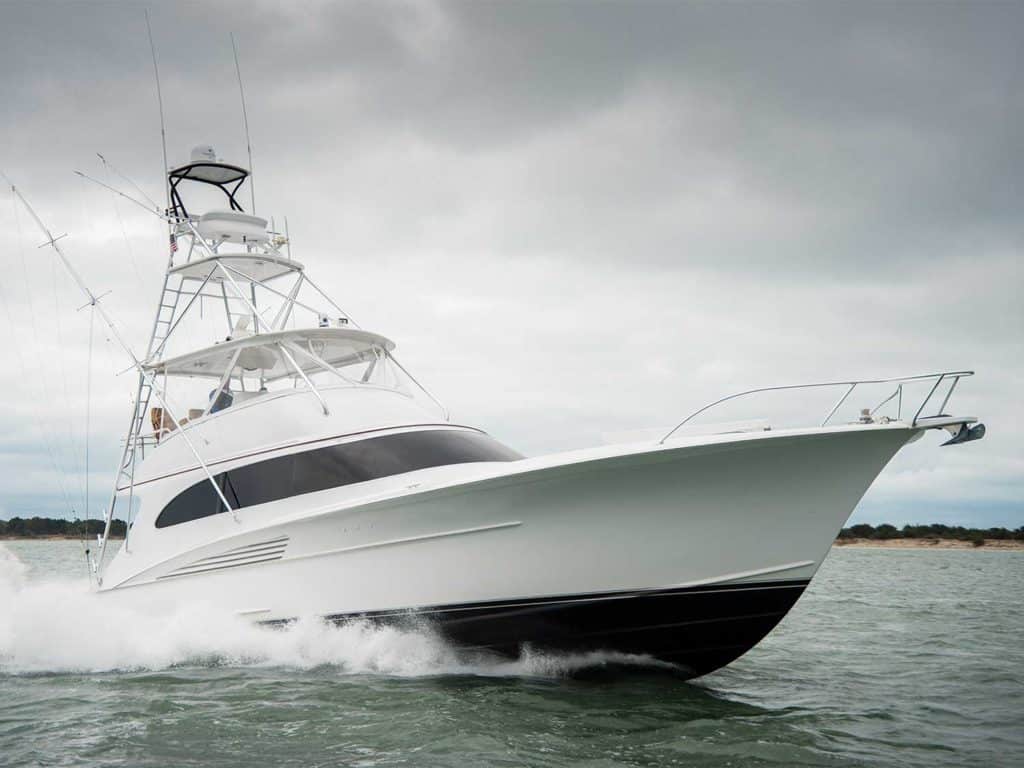
A Life of Balance
So how does someone work anywhere from 55 to 70 hours a week in a busy medical practice and still find the time to maintain and run a large custom sport-fisher as an owner/operator? His current mate, Robbie Hall, once asked Watson, “Why do you do this—why do you torture yourself?” Watson’s reply: “Because I love it.” Watson elaborated to me, saying, “The key is being able to focus on what’s important and make those choices. I like hunting and playing golf, but those are secondary to fishing. And ultimately, the underlying core is having an understanding and patient wife, which I’m extremely thankful for.” Balancing his passions for medicine and fishing, those long days in the clinic and delicate situations with cancer patients and their families make the time spent offshore with family and friends that much sweeter.
“Oil changes, sanding, installing a new ice maker or refinishing the teak on the fighting chair, Doc gets it done.”
And just because he’s an owner/operator doesn’t make him any less knowledgeable about the vessels he runs. Tolston says that Watson knows his boats intimately and can repair anything from the bilge to the bridge. “Oil changes, sanding, installing a new ice maker or refinishing the teak on the fighting chair, Doc gets it done,” he says.
Raleigh perhaps sums it up best: “I think what’s most unique about my dad is his longevity in the industry with no gaps. He has had a sport-fish boat for over 30 years. He should be an inspiration to nonprofessional guys out there. We certainly aren’t professional fishermen, but we love to do it. I know this: It has kept our family close. People like my dad are uncommon, but there are other Doc Watsons out there in the fishing industry, and it proves that if you have a passion for something, you can always find time to do it.”
